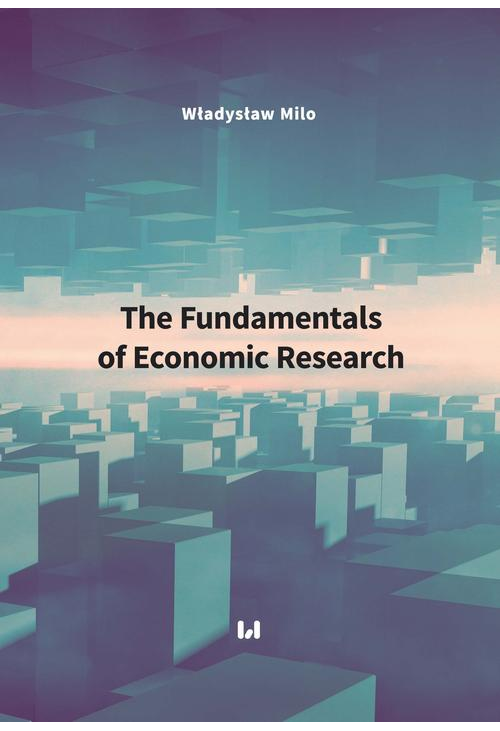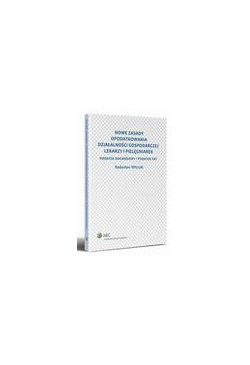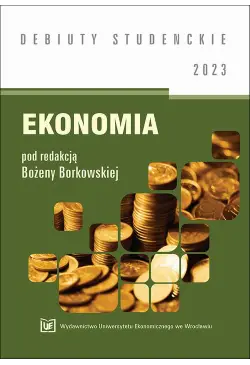
- Za darmo
ebook The Fundamentals of Economic Research
Odkryj głębię ekonomicznych badań w The Fundamentals of Economic Research autorstwa wybitnego eksperta, Władysława Milo. Ta fascynująca monografia wydana przez Wydawnictwo Uniwersytetu Łódzkiego w 2018 roku zapewnia solidne podstawy teoretyczne i empiryczne dla badaczy gospodarczych, ekonomistów, finansistów oraz specjalistów zarządzania.
Włóż się w świat analizy pojęć takich jak prawda i przyczynowość, losowość, izomorfizm, homomorfizm, modele, modelowanie, oczekiwania, narzędzia i skutki stosowania polityki pieniężnej oraz potencjał i rachunek potencjałów. Te kategorie stanowią tematy kolejnych rozdziałów tej wyjątkowej publikacji cyfrowej w formacie PDF.
Zanurz się w świecie ebooków, książek elektronicznych i najlepszych bestsellerów ebookowych dostępnych na rynku. Pobierz The Fundamentals of Economic Research już teraz i ciesz się głębokim zrozumieniem ekonomicznego myślenia oraz metodologii badawczej. Sklep z ebookami czeka na Ciebie, aby dostarczyć Ci wiedzę, której potrzebujesz do rozwoju Twojej kariery i pasji ekonomicznej.
Nie przegap okazji do zakupu tego ebooka i wzbogacenia swojej biblioteki cyfrowej! Kup e-booka już dziś i zanurz się w lekturze, która zmieni Twoje postrzeganie ekonomii. Czytanie ebooków to wygodny i nowoczesny sposób na zdobywanie wiedzy, a The Fundamentals of Economic Research jest idealnym wyborem dla ambitnych badaczy gospodarczych.
Poznaj tajemnice ekonomicznej analizy dzięki wydaniu elektronicznemu tej monografii i odkryj, jak ebooki do pobrania mogą być źródłem inspiracji i wiedzy. Zanurz się w świecie publikacji cyfrowych i ciesz się komfortem czytania na dowolnym urządzeniu. The Fundamentals of Economic Research to nie tylko książka, ale przewodnik po ekonomicznym świecie, który otworzy przed Tobą nowe horyzonty.
Nie czekaj dłużej - pobierz ten ebook już teraz i zacznij swoją podróż w głąb ekonomicznej myśli. Wydawnictwo Uniwersytetu Łódzkiego gwarantuje najwyższą jakość publikacji cyfrowej, a The Fundamentals of Economic Research to idealna pozycja dla tych, którzy pragną pogłębić swoje zrozumienie ekonomii i metodologii badań gospodarczych.
Zapraszamy do sklepu z ebookami, aby odkryć The Fundamentals of Economic Research - ebook, który stanie się Twoim przewodnikiem po świecie ekonomicznych analiz i badań. Zanurz się w lekturze już dziś i poczuj różnicę, jaką niosą ze sobą ebooki literatura piękna oraz najlepsze ebooki na rynku.
Spis treści ebooka The Fundamentals of Economic Research
Preface 9Chapter 1. Truth and causes 13
1.1. Introduction 14
1.2. Notions of truth 15
1.2.1. Truth definitions 17
1.2.2. Determinants of quality of truthfulness criteria 27
1.3. Notions of cause 32
1.4. Criteria for causality 54
1.5. Final notes 62
Bibliography 63
Chapter 2. On randomness 73
2.1. Introduction 74
2.2. Qualitative concepts of randomness from antiquity until the XIX c. 75
2.3. Final remarks 93
Bibliography 94
Chapter 3. Isomorphisms, homeomorphisms, models and modeling 97
3.1. Introduction 98
3.2. Homeomorphisms and Isomorphisms 99
3.2.1. Intuitive characterizations of Homm & Isomm 99
3.2.2. Formal characterizations of Homm 104
3.2.3. Isomorphisms 106
3.3. Homeomorphism, isomorphism and models 112
3.3.1. Category of model 114
3.4. Principles of and problems related to modeling 120
3.5. Final remarks 126
Bibliography 126
Chapter 4. On models and modeling 129
4.1. Introduction 129
4.2. The essence of models 130
4.2.1. Fundamental questions 132
4.3. Domains and co-domains of models 140
4.4. Kinds of models 143
4.5. More specific forms of models 148
4.6. Modeling and principles of modeling 150
4.7. Models and modeling in economics 162
4.8. Final remarks 170
Bibliography 171
Chapter 5. On expectations. Part I 175
5.1. Introduction 175
5.2. Concepts of rationality 178
5.3. Rational expectations and rational predictions 183
5.4. Adaptive rational expectations and predictions 188
Bibliography 192
Chapter 6. On expectations. Part II 195
6.1. Introduction 195
6.2. Non-adaptive rational economic expectations: theories and models 197
6.2.1. H. Working’s theory of rational economic expectations 206
6.2.2. J. Muth’s theory of rational economic expectations 209
6.2.3. R. E. Lucas, Jr.’s theory of rational economic expectations 214
6.2.4. T. J. Sargent’s theory of rational economic expectations 219
Bibliography 226
Chapter 7. On expectations. Part III 229
7.1. Introduction 229
7.2. Remarks on J. M. Keynes’ and H. Working’s theories of expectations 230
7.3. Remarks on J. Muth’s theory of rational expectations 234
7.4. Remarks on R. E. Lucas’ and T. Sargent’s theories of rational economic expectations 236
7.4.1. Lucas’ theory 236
7.4.2. T. J. Sargent’s theory 239
Bibliography 243
Chapter 8. Methodological problems of choosing the instruments and effects of monetary policy 245
8.1. Introduction 246
8.2. Tools of monetary policy 250
8.3. Effects of monetary policy tools 258
8.4. Final remarks 266
Bibliography 268
Chapter 9. Calculus of potentials in physics, mathematics and economics 271
9.1. Introduction 271
9.2. The measurement and calculus of potentials in physics 272
9.3. The measurement and calculus of potentials in mathematics 280
9.3.1. Classical results 280
9.4. Non-classical results 289
9.5. Measuring potential in economics 290
9.5.1. Examples of empirical applications 296
Bibliography 298
Chapter 10. On theories and theorizing 303
10.1. Introduction 303
10.2. Theories in logic 304
10.3. Theories in mathematics 307
10.4. Theories in some other fields of science 309
10.5. Final remarks 316
Bibliography 317
Szczegóły ebooka The Fundamentals of Economic Research
- Wydawca:
- Wydawnictwo Uniwersytetu Łódzkiego
- Rok wydania:
- 2018
- Typ publikacji:
- Ebook
- Język:
- angielski
- Format:
- Liczba stron:
- 318
- Miejsce wydania:
- Łódź
- ISBN dla wersji papierowej:
- 9788381421492
Recenzje ebooka The Fundamentals of Economic Research
-
Reviews (0)

Na jakich urządzeniach mogę czytać ebooki?
- Za darmo















@CUSTOMER_NAME@
@COMMENT_TITLE@
@COMMENT_COMMENT@